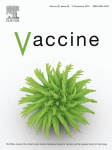Ver ítem
- xmlui.general.dspace_homeCentros e Institutos de InvestigaciónCICVyA. Centro de Investigación en Ciencias Veterinarias y AgronómicasInstituto de VirologíaArtículos científicosxmlui.ArtifactBrowser.ItemViewer.trail
- Inicio
- Centros e Institutos de Investigación
- CICVyA. Centro de Investigación en Ciencias Veterinarias y Agronómicas
- Instituto de Virología
- Artículos científicos
- Ver ítem
Accuracy of traditional and novel serology tests for predicting cross-protection in foot-and-mouth disease vaccinated cattle
Resumen
Foot-and-mouth disease virus (FMDV) antigenic-match between vaccine and field viruses has traditionally been estimated in vitro by computing the r1 value using virus neutralization test (VNT) or ELISA titers. In this study we compared the accuracy in predicting cross-protection between the r1 value estimated by VNT and two recently developed tests that measure IgG subtypes and avidity. Data analyzed consisted of 64 serum samples from FMDV A24/Cruzeiro
[ver mas...]
Foot-and-mouth disease virus (FMDV) antigenic-match between vaccine and field viruses has traditionally been estimated in vitro by computing the r1 value using virus neutralization test (VNT) or ELISA titers. In this study we compared the accuracy in predicting cross-protection between the r1 value estimated by VNT and two recently developed tests that measure IgG subtypes and avidity. Data analyzed consisted of 64 serum samples from FMDV A24/Cruzeiro vaccinated bovines challenged with the heterologous A/Argentina/2001 strain and evaluated for podal generalization. We computed the tests sensitivity (Se), specificity (Sp), and receiving operating characteristics (ROC) curve. The heterologous IgG1/IgG2 ratio was the most accurate test (Se = 0.71, Sp = 0.98), followed by heterologous IgG1 (Se = 0.53, Sp = 0.96), VNT (Se = 0.47, Sp = 1.00), whereas r1 accuracy was substantially low (Se = 0.41, Sp = 0.81). Because sensitivity of individual tests was limited, we argue that two or more of the tests should be used in combination to produce accurate estimates of protection.
[Cerrar]

Autor
Brito, Barbara Patricia;
Perez, Andrés Maximiliano;
Capozzo, Alejandra Victoria;
Fuente
Vaccine 32 (4) : 433-436 (January 2014)
Fecha
2014-01-16
Editorial
Elsevier
ISSN
0264-410X
Formato
pdf
Tipo de documento
artículo
Palabras Claves
Derechos de acceso
Restringido
 Excepto donde se diga explicitamente, este item se publica bajo la siguiente descripción: Creative Commons Attribution-NonCommercial-ShareAlike 2.5 Unported (CC BY-NC-SA 2.5)
Excepto donde se diga explicitamente, este item se publica bajo la siguiente descripción: Creative Commons Attribution-NonCommercial-ShareAlike 2.5 Unported (CC BY-NC-SA 2.5)

